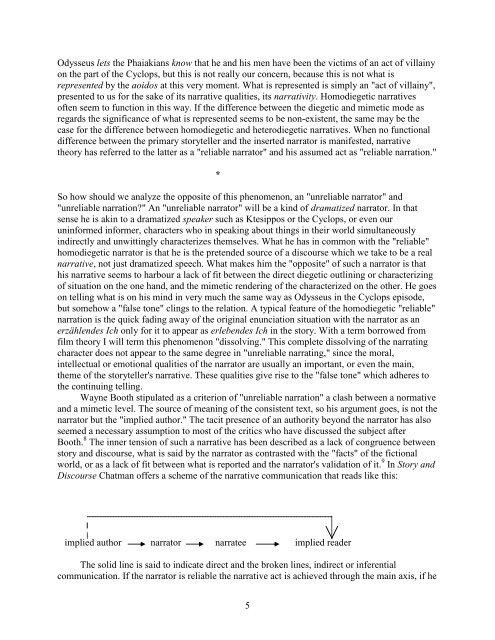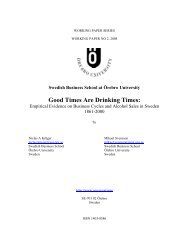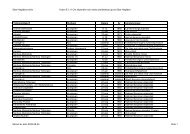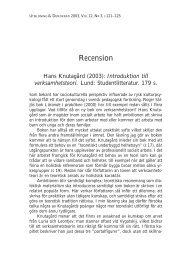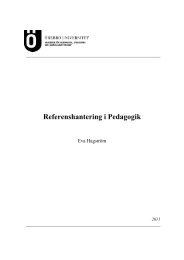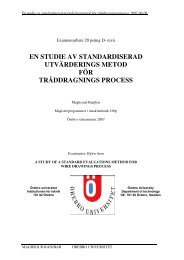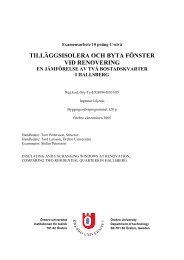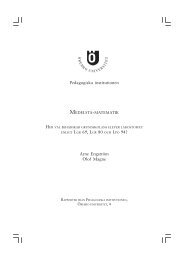Stories in Disguise: On Odysseus' Ithacan Lies and Their Relevance ...
Stories in Disguise: On Odysseus' Ithacan Lies and Their Relevance ...
Stories in Disguise: On Odysseus' Ithacan Lies and Their Relevance ...
You also want an ePaper? Increase the reach of your titles
YUMPU automatically turns print PDFs into web optimized ePapers that Google loves.
Odysseus lets the Phaiakians know that he <strong>and</strong> his men have been the victims of an act of villa<strong>in</strong>y<br />
on the part of the Cyclops, but this is not really our concern, because this is not what is<br />
represented by the aoidos at this very moment. What is represented is simply an "act of villa<strong>in</strong>y",<br />
presented to us for the sake of its narrative qualities, its narrativity. Homodiegetic narratives<br />
often seem to function <strong>in</strong> this way. If the difference between the diegetic <strong>and</strong> mimetic mode as<br />
regards the significance of what is represented seems to be non-existent, the same may be the<br />
case for the difference between homodiegetic <strong>and</strong> heterodiegetic narratives. When no functional<br />
difference between the primary storyteller <strong>and</strong> the <strong>in</strong>serted narrator is manifested, narrative<br />
theory has referred to the latter as a "reliable narrator" <strong>and</strong> his assumed act as "reliable narration."<br />
*<br />
So how should we analyze the opposite of this phenomenon, an "unreliable narrator" <strong>and</strong><br />
"unreliable narration?" An "unreliable narrator" will be a k<strong>in</strong>d of dramatized narrator. In that<br />
sense he is ak<strong>in</strong> to a dramatized speaker such as Ktesippos or the Cyclops, or even our<br />
un<strong>in</strong>formed <strong>in</strong>former, characters who <strong>in</strong> speak<strong>in</strong>g about th<strong>in</strong>gs <strong>in</strong> their world simultaneously<br />
<strong>in</strong>directly <strong>and</strong> unwitt<strong>in</strong>gly characterizes themselves. What he has <strong>in</strong> common with the "reliable"<br />
homodiegetic narrator is that he is the pretended source of a discourse which we take to be a real<br />
narrative, not just dramatized speech. What makes him the "opposite" of such a narrator is that<br />
his narrative seems to harbour a lack of fit between the direct diegetic outl<strong>in</strong><strong>in</strong>g or characteriz<strong>in</strong>g<br />
of situation on the one h<strong>and</strong>, <strong>and</strong> the mimetic render<strong>in</strong>g of the characterized on the other. He goes<br />
on tell<strong>in</strong>g what is on his m<strong>in</strong>d <strong>in</strong> very much the same way as Odysseus <strong>in</strong> the Cyclops episode,<br />
but somehow a "false tone" cl<strong>in</strong>gs to the relation. A typical feature of the homodiegetic "reliable"<br />
narration is the quick fad<strong>in</strong>g away of the orig<strong>in</strong>al enunciation situation with the narrator as an<br />
erzählendes Ich only for it to appear as erlebendes Ich <strong>in</strong> the story. With a term borrowed from<br />
film theory I will term this phenomenon "dissolv<strong>in</strong>g." This complete dissolv<strong>in</strong>g of the narrat<strong>in</strong>g<br />
character does not appear to the same degree <strong>in</strong> "unreliable narrat<strong>in</strong>g," s<strong>in</strong>ce the moral,<br />
<strong>in</strong>tellectual or emotional qualities of the narrator are usually an important, or even the ma<strong>in</strong>,<br />
theme of the storyteller's narrative. These qualities give rise to the "false tone" which adheres to<br />
the cont<strong>in</strong>u<strong>in</strong>g tell<strong>in</strong>g.<br />
Wayne Booth stipulated as a criterion of "unreliable narration" a clash between a normative<br />
<strong>and</strong> a mimetic level. The source of mean<strong>in</strong>g of the consistent text, so his argument goes, is not the<br />
narrator but the "implied author." The tacit presence of an authority beyond the narrator has also<br />
seemed a necessary assumption to most of the critics who have discussed the subject after<br />
Booth. 8 The <strong>in</strong>ner tension of such a narrative has been described as a lack of congruence between<br />
story <strong>and</strong> discourse, what is said by the narrator as contrasted with the "facts" of the fictional<br />
world, or as a lack of fit between what is reported <strong>and</strong> the narrator's validation of it. 9 In Story <strong>and</strong><br />
Discourse Chatman offers a scheme of the narrative communication that reads like this:<br />
implied author narrator narratee implied reader<br />
The solid l<strong>in</strong>e is said to <strong>in</strong>dicate direct <strong>and</strong> the broken l<strong>in</strong>es, <strong>in</strong>direct or <strong>in</strong>ferential<br />
communication. If the narrator is reliable the narrative act is achieved through the ma<strong>in</strong> axis, if he<br />
5


